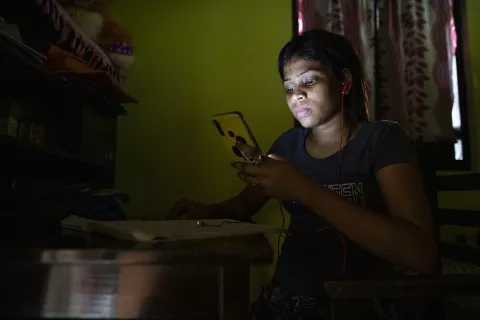16 ways to ensure your child's mental well being
Expert tips to help you support your child's mental health

Our mental health is a fundamental part of our overall health and well-being. As a parent, you play a massive role in supporting your child's mental well-being. Nurturing and loving care build a strong foundation, helping your child develop the social and emotional skills they need to lead a happy, healthy and fulfilled life.
Here are expert tips to help you support your child's mental health.
-
Make sure your child knows that they aren't alone. Reassure your child that you'll be there whenever your child needs any help or want to share any feeling or thought.
-
Tell them that even grown-ups have problems they can't solve independently. Point out that it's easier to ask for help when someone else is on your side.
-
Be emotionally open and accepting with your child regardless of gender.
Tell your child that it's normal for teens to worry, feel stressed, or feel sad.

- Encourage your adolescent/teenager to share their feelings.
-
Look for ways to check in with your adolescent/teenager. Ask them how their day has been and what they have been doing.
-
Try to give your adolescent/teenager the appropriate time and space to be on their own.
-
Tell your child that it's normal for teens to worry, feel stressed, or sad.
-
Tell your child that it can be scary to talk about how they feel and what they think, but it's okay to share and the right thing to ask for help.
-
If your child doesn't want to talk to you, suggest other people they could talk to, like aunts or uncles, close family friends, a trusted sports coach or religious leader, an elder, or your doctor.
-
If your child doesn't want to talk to you, suggest other people they could talk to, like aunts or uncles, close family friends, a trusted sports coach or religious leader, an elder, or your doctor.
-
If your adolescent/teenager feels frustrated, work with them to brainstorm some solutions to their problems.
-
Tell your child that it is safe to talk to their doctor or other health professionals.
-
Tell them it’s ok to take a break, pause or time to relax.
-
Encourage your teen to take breaks from schoolwork, housework, or other activities, to do things they enjoy. Suggest them some activities of their choice as healthy alternative engagements.
-
It is essential to first take good care of yourselves to help better your children nurture, grow, and develop in a positive and safe environment.
-
Praise yourself for what you have done well!
-
If you feel distressed, seek help. It is safe to talk to your doctor or other health professionals.
Be emotionally open and accepting with your child regardless of gender.

-
If your adolescent/teenager feels frustrated, work with them to brainstorm some solutions to their problems.
-
Tell your child that it is safe to talk to their doctor or other health professionals.
-
Tell them it’s ok to take a break, pause or time to relax.
-
Encourage your teen to take breaks from schoolwork, housework, or other activities, to do things they enjoy. Suggest them some activities of their choice as healthy alternative engagements.
-
It is essential to first take good care of yourselves to help your children nurture, grow, and develop in a positive and safe environment.
-
Praise yourself for what you have done well!
-
If you feel distressed, seek help. It is safe to talk to your doctor or other health professionals.
If your adolescent/teenager feels frustrated, work with them to brainstorm some solutions to their problems.




